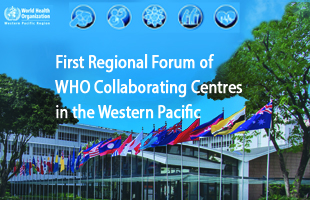
WHO
The World Health Organization (WHO) Western Pacific Region faces many of the world's most pressing health issues and natural disasters—from noncommunicable diseases and escalating health-care costs to persistent risks of new infections and climate change-related diseases.
To better address the needs of Member States, WHO works with WHO collaborating centres, whose representatives are gathering in Manila for the inaugural Regional Forum of WHO collaborating centres in the Western Pacific. The forum is an opportunity to identify innovative ways to enhance partnerships between WHO and collaborating centres. Participants will also share good practices and success stories of effective collaboration.
WHO Regional Director for the Western Pacific, Dr Shin Young-soo said WHO uses the expertise of collaborating centres "whether developing technical guidance on complex public health issues, responding to transnational public health emergencies, or building technical capacity in Member States." Dr Shin said the forum will provide an opportunity to develop "our shared understanding of the global health architecture and roles at the regional level."
What are WHO collaborating centres?
WHO collaborating centres such as research institutes or parts of universities are designated by the WHO Director-General to carry out activities in support of WHO's programmes. Their activities include; providing laboratory services for issues of regional importance; assisting in the development of global and regional norms, guidelines and standards; gathering and analysing data on regional issues; disseminating information; and providing country-specific support on request of WHO.
In the Western Pacific Region, more than 180 WHO collaborating centres in 10 Member States work with WHO on areas such as nursing, occupational health, communicable diseases, nutrition, mental health, chronic diseases and health technologies. Globally, there are more than 800 WHO collaborating centres in more than 80 Member States.
A win-win relationship
The collaboration provides WHO with access to top scientific centres worldwide and the institutional capacity to support its global health work. Collaborating centres benefit from enhanced visibility and recognition by national authorities, calling public attention to their local health issues. The designation also enhances opportunities to exchange information and cooperate with institutions internationally.




